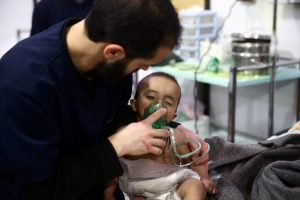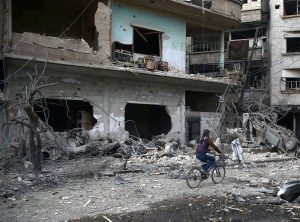
By Stephanie Nebehay
GENEVA (Reuters) – Russia has violated its duty to guarantee the destruction of Syria’s chemical weapons and prevent the Assad government from using banned poison gas, the United States said on Wednesday.
“For Russia to claim that the Assad regime has eliminated its chemical stockpiles is just absurd. Its continued denial of the Assad’s regime culpability in the use of chemical weapons is simply incredible,” U.S. disarmament ambassador Robert Wood told the Conference on Disarmament.
“Russia needs to be on the right side of history on this issue. It is currently on the wrong side of history,” he said.
Syria again denied U.S. allegations that it had used chemical weapons against rebel-held areas, and said that “terrorist groups” including Nusra Front and Islamic State had obtained some stocks.
“Syria cannot be possibly using chemical weapons because it very simply has none in its possession,” Hussam Aala, Syrian ambassador to the United Nations in Geneva, told the forum.
The world’s chemical weapons watchdog in the Hague opened an investigation on Sunday into attacks in the besieged, rebel-held Syrian region of eastern Ghouta to determine whether banned munitions had been used, diplomatic sources told Reuters.
Syria signed up to the international ban on chemical weapons in 2013, as part of a deal brokered by Moscow to avert U.S. air strikes in retaliation for a nerve gas attack that killed hundreds of people, which Washington blamed on Damascus. In the years that followed, Syria’s declared stockpile of banned poison gasses was destroyed by international monitors.
Syria’s government had made an “unprecedented achievement by destroying all its chemical weapons in record time and in a manner that is irrevocable, although field conditions were extremely complex due to our war against terrorism”, Aala said.
The United States said last year that Syria again used the banned nerve gas sarin, and President Donald Trump ordered air strikes.
Washington has since said it has evidence that Syria has used chlorine gas in attacks in recent weeks. Rescue workers and medics on the ground have described residents choking on fumes after air strikes.
Unlike nerve gas, chlorine is legal for countries to possess for water purification and other civilian purposes, but using it as a weapon is banned.
Russian Foreign Minister Sergei Lavrov, addressing the Conference on Disarmament, said Syria had eliminated its chemical weapons stockpile and placed its arsenal under international control.
Lavrov said the United States was repeating allegations by what he called “fully-discredited” Syrian rescue workers in rebel-held areas, who had put forth “absurd claims against the government of Syria”.
“We note that the U.S. and its allies are simply exploiting baseless allegations of toxic weapons use by Damascus as a tool of anti-Syrian political engineering,” Lavrov added.
(Additional reporting by Cecile Mantovani; Editing by Raissa Kasolowsky and Peter Graff)










